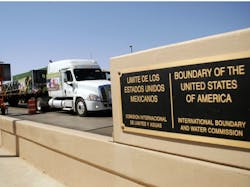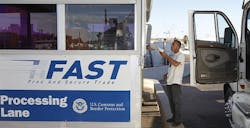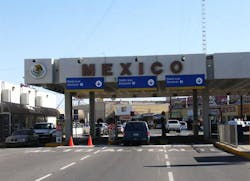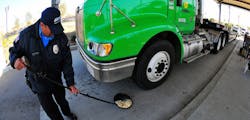Promoting e-commerce and more use of technology to speed border crossings were among the recommendations freight stakeholders offered the Trump administration as it looks toward a renegotiation of the North American Free Trade Agreement (NAFTA).
U.S. Trade Representative Robert Lighthizer received 12,450 comments ahead of a June 27 hearing on NAFTA modernization. Most were from individuals, who shared a range of opinions on the 23-year-old pact.
Business groups expressed little support for terminating NAFTA, as Trump previously threatened. Instead, they recommended a harmonization of rules and new infrastructure investments to better align the trade deal with today’s digital world and integrated supply chains.
“The huge potential of e-commerce in North America for U.S. exporters has yet to be fully realized because of the complexity, cost, and unpredictability of moving low-value, individual shipments across Mexican and Canadian borders,” FedEx Corp. wrote.
FedEx, United Parcel Service (UPS), the U.S. Council for International Business, and the Express Association of America were among the commenters calling on Mexico and Canada to boost the de minimis threshold. That is the level under which imported products are exempt from certain taxes, and streamlined through customs screenings.
“De minimis has become particularly important with the rapid growth of e-commerce,” FedEx wrote. While the figure is $800 in the U.S., it is about $50 in Mexico and only $15 in Canada.
FedEx also is seeking the removal of restrictions against foreign-owned express delivery firms from operating their own vehicles on Mexican federal highways.
UPS noted less-than-truckload carriers are not able to use Free and Secure Trade (FAST) lanes. However, because UPS regularly screens shippers, it said U.S.-inbound trucks should be considered eligible. Expedited clearance programs should expand to serve U.S. shipments into Canada and Mexico, the company wrote.
American Trucking Associations requested the administration not change NAFTA’s trucking provisions, but consider several other tweaks.
One key change, wrote chief economist Bob Costello, is allowing commingling of cargo entering Mexico. Currently, a carrier moving 20 shipments from different brokers must segregate them into separate trailers when entering the country. And while maintaining cabotage rules, ATA wants foreign truck drivers be allowed to reposition empty trailers, a practice known as “drop and hook.”
The North American Strategy for Competitiveness (NASCO) took a different position, recommending an examination of “restrictive cabotage rules in [the U.S.] where [Canada and Mexico] are willing to reciprocate, thus enabling the flexibility to maximize supply chain and labor efficiencies.”
NASCO recommended the creation of an infrastructure bank between the nations to fund border upgrades, implement technologies, and foster the increased use of alternative fuels.
New funding mechanisms, including public-private partnerships, were touted in many comments, including the including the Business Council of Canada.
The San Diego – Tijuana Smart Border Coalition added the U.S. should increase its investment in the North American Development Bank, which helps finance projects for communities along the U.S.-Mexico border. The coalition also advocated for an inter-agency body to improve coordination. It said several times earlier this year Mexico closed the El Chaparral port of entry due to protests, but the U.S. Customs and Border Protection was not notified until minutes before the closures.
The North American Meat Institute cited the electronic documentation system the Department of Agriculture will begin rolling in late June as the type of program NAFTA should be moving toward.
Any changes are particularly crucial to companies like Rassini, a Mexican-based manufacturer of vehicle parts that moves 1,500 tons of its products across borders every day.
“More import specialists, expansion of FAST lanes on both sides of the border, and increased use of technology (x-rays vs. manual inspections) would greatly improve the timeliness of automotive trade between Mexico and the U.S.,” the company wrote.
Agricultural and food lobbying groups cited the need for updated sanitary and phytosanitary (SPS) rules to ensure safety and fairness. SPS was also cited by Union Pacific, the nation’s largest freight railroad, which also warned against dragging out the renegotiations.
“The longer businesses are left uncertain about the future of U.S. trade with Canada and Mexico, the more likely they are to delay job-creating investments,” said Lance Fritz, Union Pacific’s chairman, president and CEO.
Another frequent comment was to seek ways to more easily resolve conflicts. That was a particular point made by lumber groups, currently embroiled in a softwood lumber tariff dispute.
Other commenters expressed a higher degree of criticism with the trade pact.
The Owner-Operator Independent Drivers Association called a reversal of the measure allowing Mexican-based carriers from operating in the U.S.
“The United States has much to lose by allowing motor carriers and drivers who are not required to comply with each of our safety regulations or obligated to use equipment that meets our latest [Environmental Protection Agency] rules, to operate on our highways,” OOIDA wrote.
Josh Nassar, legislative director of the United Auto Workers, said, “it is critical for the Trump administration to drastically overhaul the agreement to ensure that workers are paid wages they can support their families with and have the right to collectively bargain.”
About the Author
Neil Abt
Neil Abt is a former FleetOwner editor who wrote for the publication from 2017 to 2020. He was editorial director from 2018 to 2020.



